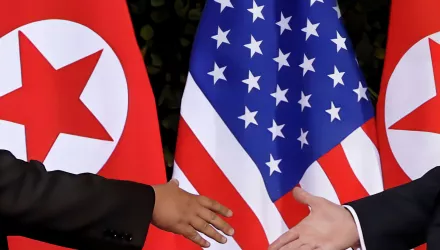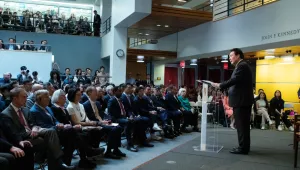Former US undersecretary of state, R. Nicholas Burns, discusses US options, the importance of Chinese pressure, and lessons learned from the Iran nuclear crisis
By Ashish Kumar Sen
New sanctions imposed by the United Nations Security Council on September 11 in response to North Korea’s latest nuclear test are “not significant enough,” according to R. Nicholas Burns, an Atlantic Council board member who served as undersecretary of state for political affairs in the George W. Bush administration.
Sanctions must be part of a “patient long-term strategy” that includes deterrence, working closely with allies, and negotiations, said Burns, laying out the United States’ options for dealing with the North Korean crisis.
Capping a summer marked by defiant intercontinental ballistic missile (ICBM) tests, North Korean leader Kim Jong-un dramatically escalated the crisis on September 3 by successfully testing a miniaturized hydrogen bomb that is capable of being placed on an ICBM. On September 15, North Korea launched a missile over Japan—it's second such act in just over two weeks. The test was in defiance of a fresh round of sanctions imposed by the United Nations Security Council on North Korea earlier in September.
As the third-highest-ranking official at the State Department from 2005 to 2008, Burns was the lead US negotiator on Iran’s nuclear program. Drawing on that experience, he emphasized the need for a multilateral approach to defuse the North Korean crisis. China, he said, would be a critical player in such an approach.
R. Nicholas Burns spoke in a phone interview with the New Atlanticist’sAshish Kumar Sen. Here are excerpts from that interview.
Q: Since sanctions take time to have an impact, and given the fact that North Korea has stepped up the pace of its missile and weapon tests, can this new round of UN sanctions be an effective deterrent?
Burns: The sanctions are a step forward, but they are not significant enough. It is disappointing that Russia and China will not agree to tougher sanctions because that is what is required. We are in a new and dangerous phase of the crisis following the apparent hydrogen bomb test and also the ballistic missile firing by North Korea over Hokkaido. The world community has got to take stronger actions against North Korea to convince the North Koreans to freeze their nuclear program and agree to negotiations to try to diminish this crisis.
Q: How important is China’s support for these sanctions to be effective? Are the Chinese doing enough?
Burns: China is a key player. It clearly has leverage and influence over North Korea through its energy and food exports, and also through the fact that it is its closest neighbor. The Chinese don’t appear to like Kim Jong-un. In fact, they seem to be frustrated by him. They have not shown him any respect. They have refused to invite him to Beijing.
The Chinese clearly don’t want a conflict on the peninsula and they don’t want a crisis that will inhibit trade because China has a very important trade relationship with both South Korea and Japan.
The Chinese have a direct interest here, but they are hesitating in deepening their own leverage and coercion against North Korea. It may be that China worries that a dissolution of the North Korean regime could lead to a flow of North Korean refugees into China. It is certainly true that the Chinese worry that any kind of crisis that could weaken or destroy North Korea and could lead to the unification of the Korean Peninsula with its capital in Seoul—a country that is aligned with the United States—is not in China’s interests.
There are all sorts of limitations that the Chinese have imposed on themselves but, in the end, it is not in China’s interests to see this spiral out of control. They have got to act with greater determination and greater vigor. I hope that will happen, but we are clearly not there yet.
Q: What kind of leverage does China have in North Korea?
Burns: We have seen that Kim Jong-un is exercising a high degree of independence from Beijing. The Chinese do not like what he is doing and saying. And yet, because of the fear of refugees and the fear of dissolution of the North Korean state, the Chinese are not willing to push him as hard as we would like.
I think this is a test for China. They would be irresponsible not to exercise leverage against North Korea given the stakes involved. I don’t think the probability of a war is high, but it certainly exists. China has to be more determined to use its influence to ensure a satisfactory outcome to the crisis.
In a larger sense, this is a test of China’s desire to be taken seriously as one of the two great global powers, and certainly one of the principal powers in Asia. If China is not willing to do the tough things then it is not going to be an effective global leader. North Korea is going to be an early test as China reaches the point where, in economic, political, and military terms, it is second only to the United States.
Churchill said to the Americans during the Second World War that the price of greatness is responsibility. I think it applies in this case. If China wants to be a great power, it has got to act like one.
The Trump administration is receiving important support from Britain and France in the [UN] Security Council. Europe certainly is not a Pacific power in the way the United States is due to our geography and our history, but we will need the unstinting support of Europe. It is not a frontline state to the crisis, but it can be another pressure point on the Chinese and the Russians to urge them to do the right thing.
Q: What options does the United States have to deal with this crisis?
Burns: The United States has to have a patient long-term strategy. North Korea is strong enough and sufficiently advanced in its acquisition of nuclear weapons that this crisis cannot be resolved in the short term.
There is a series of steps that the United States could take.
First, we have to strengthen our own defenses to make it very clear to the North Koreans that we will defend South Korea; Japan; American forces in Korea and Japan; and, of course, the territory of the United States if North Korea attacks any one of them. We have to go back to the deterrence that we practiced so well to contain Soviet power and Chinese communist power in the decades of the Cold War. I think [US Defense] Secretary [James] Mattis was very effective when he warned the North Koreans of massive American retaliation should the North Koreans attack the United States, South Korea, or Japan.
Second, it is important to follow Teddy Roosevelt’s maxim: speak softly, but carry a big stick. We shouldn’t make threats that we can’t back up. [US] President [Donald J.] Trump has made a series of threats to North Korea that he hasn’t been able to back up. Less talk and fewer tweets from the White House and more steely determination of the type that Mattis and [US Secretary of State Rex] Tillerson have been practicing makes sense to me.
Third, this is no time to criticize our allies. When President Trump accused the South Korean government of appeasement and when he threatened to withdraw from the US-South Korea free trade agreement at the height of the crisis, just following the hydrogen bomb test, it was exactly the wrong way to treat an ally at a time of crisis. This is the time when we need to embrace South Korea and Japan, and make it absolutely clear to Kim Jong-un that we will protect them and defend them, and that there is not an inch of separation between us. That’s what one does in a crisis with allies.
Fourth, we have to set realistic goals. It will not be possible to convince the North Koreans to give up their nuclear weapons in the short term, but might it be possible to, through pressure and negotiation, convince them to freeze their nuclear program? That would not be a satisfactory outcome given our strategic ambitions in the region, but it would be better than the situation that we have now.
Fifth, we have to find a way to negotiate. If you practice strategic deterrence and make it clear that we are stronger militarily, you have to combine that with a willingness to talk directly to the North Koreans to get a sense of what their ultimate goals are and if any kind of compromise is possible. We should open up a process to lower the temperature to back the North Koreans away from a crisis and to try to use negotiations—this could take months and years—to get the North Koreans to a safer place.
Sixth, Henry Kissinger wrote a very thoughtful op-ed in the Wall Street Journallast month where he essentially said we have to create a combined effort with the Chinese to try to negotiate a resolution of this crisis. That will entail the United States not just expecting the Chinese to do what is in the interests of the United States, but what is also in the interests of China.
Finally, as the United States goes forward, we have to have a comprehensive strategy ourselves that includes deterrence, United Nations’ sanctions, and financial sanctions by the United States. If China fails to agree with us on a combined diplomatic approach, and fails to put the necessary pressure on North Korea, the United States should think about secondary sanctions on Chinese banks and state enterprises that lend money and trade with North Korea.
Q: What lessons can be learned from the Iran nuclear crisis, which you worked on while in government?
Burns: There are lessons from what we did successfully in Iran that we could apply to North Korea despite the differences between the two countries.
One, we have to have a long-term strategy; two, we have to be patient in applying that strategy; three, we have to have allies and friends. In the case of Iran, in December 2005, we formed the P5+1 group, which turned out to be the key group that was able to coerce the Iranians into negotiations. We tried a variation of this a decade ago when I was undersecretary of state with the six-party talks on North Korea.
Some variation of that group is going to have to be re-formed to apply the kind of pressure on North Korea that is warranted and, hopefully, to have China on our side of the table. Russia is a spoiler. It doesn’t have decisive influence in Pyongyang.
In addition, the United States not [only] acted multilaterally in the [George W.] Bush and Obama administrations on Iran, we also took the opportunity to act unilaterally when necessary in applying the US financial sanctions in 2007 and in threatening the use of force in a defensive way.
Q: What is your assessment of the way the Trump administration has handled this crisis?
Burns: The Trump administration has some very skillful people—Secretary Mattis, Secretary Tillerson, [National Security Advisor] Gen. [H.R.] McMaster. These are people who have done well in articulating American objectives. They have done the right thing in going to the Security Council and trying to appeal to [Chinese President] Xi Jinping to bring China’s influence to bear. Frankly, on this issue, I think the Trump administration has had the right outlook; they’ll now just need the patience and, I hope, bipartisan support in the United States to carry out a successful strategy.
I also see Secretary Mattis and Secretary Tillerson in their public comments [as] more effective and more responsible than the president has been. The president’s implicit, if not explicit, threat of nuclear war over the summer, his intemperate remarks against South Korea have been widely off the mark. The statements of Mattis and Tillerson have been sober, correct, and precise and the right kind of statements in a crisis like this.
Q: What is Kim Jong-un thinking?
Burns: The key analytical question has always been about whether Kim Jong-un is rational or not. This does not appear to be a suicidal regime in North Korea. He does not appear to be leading in an irrational way.
Strategic deterrence can be applied here, but we have to be very careful in our public statements not to confuse the North Koreans or be so bombastic ourselves that he might misunderstand our intentions. That could lead possibly to an accidental conflict. [Trump] needs to be more restrained, more intelligent, and more sophisticated in his public comments.
Follow R. Nicholas Burns on Twitter @RNicholasBurns.
Ashish Kumar Sen is deputy director of communications at the Atlantic Council. Follow him on Twitter @AshishSen.
The full text of this publication is available via Atlantic Council.




